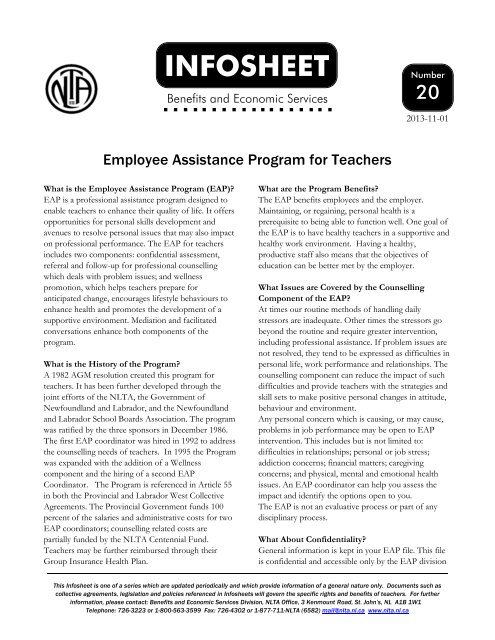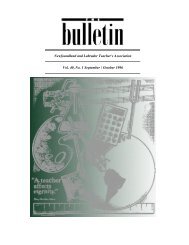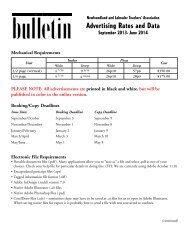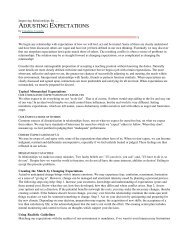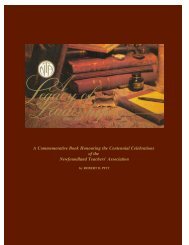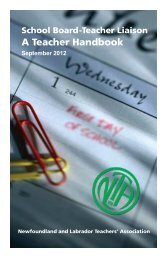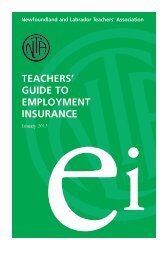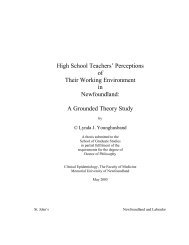Employee Assistance Program for Teachers (EAP) - Newfoundland ...
Employee Assistance Program for Teachers (EAP) - Newfoundland ...
Employee Assistance Program for Teachers (EAP) - Newfoundland ...
- No tags were found...
Create successful ePaper yourself
Turn your PDF publications into a flip-book with our unique Google optimized e-Paper software.
INFOSHEETBenefits and Economic Services Number202013-11-01<strong>Employee</strong> <strong>Assistance</strong> <strong>Program</strong> <strong>for</strong> <strong>Teachers</strong>What is the <strong>Employee</strong> <strong>Assistance</strong> <strong>Program</strong> (<strong>EAP</strong>)?<strong>EAP</strong> is a professional assistance program designed toenable teachers to enhance their quality of life. It offersopportunities <strong>for</strong> personal skills development andavenues to resolve personal issues that may also impacton professional per<strong>for</strong>mance. The <strong>EAP</strong> <strong>for</strong> teachersincludes two components: confidential assessment,referral and follow-up <strong>for</strong> professional counsellingwhich deals with problem issues; and wellnesspromotion, which helps teachers prepare <strong>for</strong>anticipated change, encourages lifestyle behaviours toenhance health and promotes the development of asupportive environment. Mediation and facilitatedconversations enhance both components of theprogram.What is the History of the <strong>Program</strong>?A 1982 AGM resolution created this program <strong>for</strong>teachers. It has been further developed through thejoint ef<strong>for</strong>ts of the NLTA, the Government of<strong>Newfoundland</strong> and Labrador, and the <strong>Newfoundland</strong>and Labrador School Boards Association. The programwas ratified by the three sponsors in December 1986.The first <strong>EAP</strong> coordinator was hired in 1992 to addressthe counselling needs of teachers. In 1995 the <strong>Program</strong>was expanded with the addition of a Wellnesscomponent and the hiring of a second <strong>EAP</strong>Coordinator. The <strong>Program</strong> is referenced in Article 55in both the Provincial and Labrador West CollectiveAgreements. The Provincial Government funds 100percent of the salaries and administrative costs <strong>for</strong> two<strong>EAP</strong> coordinators; counselling related costs arepartially funded by the NLTA Centennial Fund.<strong>Teachers</strong> may be further reimbursed through theirGroup Insurance Health Plan.What are the <strong>Program</strong> Benefits?The <strong>EAP</strong> benefits employees and the employer.Maintaining, or regaining, personal health is aprerequisite to being able to function well. One goal ofthe <strong>EAP</strong> is to have healthy teachers in a supportive andhealthy work environment. Having a healthy,productive staff also means that the objectives ofeducation can be better met by the employer.What Issues are Covered by the CounsellingComponent of the <strong>EAP</strong>?At times our routine methods of handling dailystressors are inadequate. Other times the stressors gobeyond the routine and require greater intervention,including professional assistance. If problem issues arenot resolved, they tend to be expressed as difficulties inpersonal life, work per<strong>for</strong>mance and relationships. Thecounselling component can reduce the impact of suchdifficulties and provide teachers with the strategies andskill sets to make positive personal changes in attitude,behaviour and environment.Any personal concern which is causing, or may cause,problems in job per<strong>for</strong>mance may be open to <strong>EAP</strong>intervention. This includes but is not limited to:difficulties in relationships; personal or job stress;addiction concerns; financial matters; caregivingconcerns; and physical, mental and emotional healthissues. An <strong>EAP</strong> coordinator can help you assess theimpact and identify the options open to you.The <strong>EAP</strong> is not an evaluative process or part of anydisciplinary process.What About Confidentiality?General in<strong>for</strong>mation is kept in your <strong>EAP</strong> file. This fileis confidential and accessible only by the <strong>EAP</strong> divisionThis Infosheet is one of a series which are updated periodically and which provide in<strong>for</strong>mation of a general nature only. Documents such ascollective agreements, legislation and policies referenced in Infosheets will govern the specific rights and benefits of teachers. For furtherin<strong>for</strong>mation, please contact: Benefits and Economic Services Division, NLTA Office, 3 Kenmount Road, St. John’s, NL A1B 1W1Telephone: 726-3223 or 1-800-563-3599 Fax: 726-4302 or 1-877-711-NLTA (6582) mail@nlta.nl.ca www.nlta.nl.ca
of the NLTA and is destroyed by request or within oneyear after closure.For voluntary referrals, no in<strong>for</strong>mation is shared withthe school or district without the teacher’s consent.When seeing an outside counsellor, the in<strong>for</strong>mationshared between that counsellor and the teacher remainsconfidential.A teacher’s email contact, phone call or visit to an <strong>EAP</strong>Coordinator will start the process. However, whenpersonal behaviour or job per<strong>for</strong>mance is affected, theteacher may be approached by the principal or acolleague suggesting that the teacher access <strong>EAP</strong>support.An interview will be set up so the Coordinator canassist the teacher in identifying issues and plan aneffective approach to resolving them. <strong>Teachers</strong> mayalso receive educational support directly though theWellness <strong>Program</strong>.For mandatory referrals, the Director of the schooldistrict recommends the teacher’s involvement andcontacts an <strong>EAP</strong> coordinator in writing. The Directoris then in<strong>for</strong>med of the teacher’s decision whether ornot to participate and remain involved in the <strong>EAP</strong>.Despite a Director’s recommendation, a teacher mayrefuse. If job per<strong>for</strong>mance is affected, the Director maycall a meeting with the teacher and require the teacher’s<strong>EAP</strong> involvement. A representative from the NLTAmay be present at this meeting at the teacher’s request.For this mandatory referral, the <strong>EAP</strong> Coordinator isnotified in writing and obligated to in<strong>for</strong>m the Directorof the teacher’s decision to accept a mandatory <strong>EAP</strong>referral. Refusal places the teacher in a position wherethe board may seek other avenues to ensure that theteacher’s job per<strong>for</strong>mance meets acceptable standards.What Costs Are Covered?The program is designed to assist with counselling andlimited travel costs <strong>for</strong> the teacher. The <strong>EAP</strong> does notcover Counselling <strong>for</strong> a child or partner.Assessment and CounsellingThere is no cost <strong>for</strong> assessment or referral by the <strong>EAP</strong>coordinator. When the referral is made to a counsellor,the program covers 50 percent of such costs up to amaximum of $40 per hour, subject to the lifetime limitof $2,000. The NLTA Group Health Insurance Plan orother health insurance policies may cover additionalexpenses.Transportation to a Counselling AppointmentTravel to accommodate the service will be subsidized<strong>for</strong> the most economical means available, according tothe NLTA <strong>EAP</strong> Policy.Sick Leave ProvisionsThrough the <strong>Employee</strong> <strong>Assistance</strong> <strong>Program</strong>, teacherscan use available sick leave to attend counsellingsessions. (Schedule F – MOU re: <strong>Employee</strong> <strong>Assistance</strong><strong>Program</strong>.) Such sick leave is provided in accordancewith the provisions of Article 15 of the ProvincialCollective Agreement and Article 27 of the LabradorWest Agreement.What is Covered by the WellnessComponent of the <strong>EAP</strong>?The wellness component consists of several approachesto creating a healthy workplace. Ef<strong>for</strong>ts are made toencourage a supportive work environment throughpolicies and programs which promote a physically andpsychologically healthy and respectful workplace. Thisoccurs through <strong>EAP</strong> involvement with: NLTA, SchoolBoard and government officials; school administratorsand committees; and, direct support to individualteachers. There is no cost <strong>for</strong> teachers to access theWellness <strong>Program</strong> supports.Wellness Workshops and WebinarsPrint in<strong>for</strong>mation, presentations, webinars, orworkshops to enhance well-being are available.<strong>EAP</strong> Coordinators can provide materials or offersessions at the request of school groups, schooldistricts, NLTA branches, Special Interest Councils, orindividual teachers. Common requests include topicsof: stress management; life balance; change; staffmorale; respectful workplace; self esteem and self-care;resilience; conflict; and, building relationships. Allworkshops are designed to meet the specific needs ofthe group making the request. Topics and contentreflect the needs identified. The webinars run one hourand the wellness sessions vary in length.<strong>EAP</strong> Coordinators also provide assistance to schools inusing established programs or committees to promoteteacher wellness. This is done through: the SchoolDevelopment Plan, Safe and Caring Schools,Respectful Workplace, Healthy Students HealthySchools, Occupational Health & Safety, the <strong>EAP</strong>webinar series, or other initiatives which can adopt ateacher wellness focus.<strong>EAP</strong> coordinators also assist teachers, administratorsand Board office personnel in working together toresolve issues which are impacting a teacher’s wellbeing.For more in<strong>for</strong>mation, contact one of the <strong>EAP</strong>Coordinators:Tel: 709-726-3223 or 1-800-563-3599 (toll-free)• Judy Beranger (Ext. 265)• Gail Carroll (Ext. 242)


